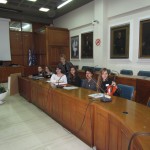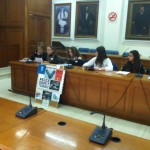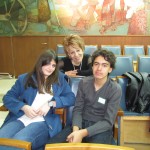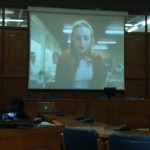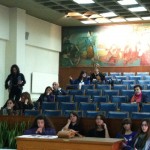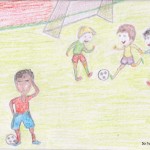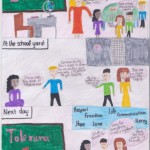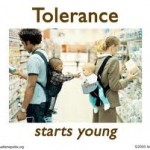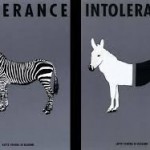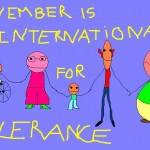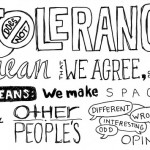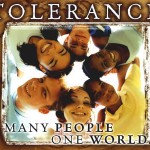Το 3ο Γυμνάσιο Τρικάλων συμμετέχει σε σχέδιο σύμπραξης διάρκειας 2 ετών με τίτλο ?SCHOOLS WITHOUT BORDERS?, το οποίο υλοποιείται στο πλαίσιο του Ευρωπαϊκού προγράμματος Comenius regio.
Η σύμπραξη στοχεύει:
Στη βελτίωση της παρεχόμενης εκπαίδευσης στις εμπλεκόμενες περιφέρειες. Παρέχει την ευκαιρία σε Εκπαιδευτικές αρχές διαφορετικών περιφερειών της Ευρώπης σε συνεργασία με σχολεία και άλλους φορείς παροχής εκπαίδευσης να συνεργαστούν σε θέματα αμοιβαίου ενδιαφέροντος, να γίνουν ανταλλαγές εκπαιδευτικών ανάμεσα στις μονάδες αυτές με σκοπό την επιμόρφωση, την παρακολούθηση σεμιναρίων, την γνωριμία με τις διάφορες περιοχές και χώρες, την ενίσχυση της Ευρωπαϊκής διάστασης της Εκπαίδευσης και την βελτίωση της εκμάθησης ξένων γλωσσών και της διαπολιτισμικής ευαισθητοποίησης.
Ειδικότερα η συγκεκριμένη σύμπραξη δίνει προτεραιότητα:
- Στην καλλιέργεια της ανεκτικότητας και στον σεβασμό της διαφορετικής κουλτούρας και του διαφορετικού πολιτισμού.
- Στην αμοιβαία κατανόηση και αλληλεγγύη ανάμεσα στα μέλη μιας
- εκπαιδευτικής κοινότητας.
- Στη δημιουργία μιας θετικής στάσης ζωής σε οτιδήποτε το διαφορετικό.
Στην αντιμετώπιση φαινομένων ρατσισμού, βίας, ξενοφοβίας και κοινωνικού αποκλεισμού στο σχολείο.Οι περιφέρειες εταίροι που στηρίζουν την σύμπραξη είναι:
Περιφέρεια εταίρος 1
Διεύθυνση Δευτεροβάθμιας Εκπαίδευσης
- 1ο Γυμνάσιο Καλαμπάκας
- 3ο Γυμνάσιο Τρικάλων (Συντονίστρια: Τέγου Ρίτσα, ΠΕ06, Συμμετέχουσες καθηγήτριες: Ηλιάδη Αμαλία, ΠΕ02, Δ/ντρια, Μαγαλιού Καλλιόπη, ΠΕ19)
- 3ο Λύκειο Τρικάλων
- Λύκειο Βαλτινού
- ΕΠΑΛ Πύλης
- Ασκληπιός
- e-trikala
Περιφέρεια εταίρος 2
Ecole Industrielle de Jumet
- Centre R?gional d?Int?gration de Charleroi
- Section r?gionale de Charleroi de la Ligue de l΄Enseignement et de l΄ Education permanente
- Centre d΄ ion La?que De Charleroi.
Το πρόγραμμα προβλέπει εκπόνηση εργασιών από ομάδα μαθητών του σχολείου μας, συμμετοχή σε debate με παρουσιάσεις που η θεματολογία τους αφορά στις έννοιες της ανεκτικότητας, της διαφορετικότητας, της αλληλεγγύης και του σεβασμού στη ανθρώπινη ύπαρξη, καθώς και στην ανταλλαγή καλών πρακτικών και προώθησης συνεργασίας αποβλέποντας στην βελτίωση της Εκπαιδευτικής προσφοράς στους νέους.
Συμμετοχή του 3ο Γυμνασίου Τρικάλων σε debate με τους εταίρους του Βελγίου.
Την Παρασκευή 15/11/2013 πραγματοποιήθηκε debate, στην αίθουσα του Δημοτικού Συμβουλίου Τρικάλων, με την συμμετοχή μαθητών του 1ου Γυμνασίου Καλαμπάκας, του 3ου Γυμνασίου Τρικάλων και του 3ου Λυκείου Τρικάλων με τους αντίστοιχους εκπαιδευτικούς φορείς του Βελγίου, στα πλαίσια του προγράμματος Comeniuς Regio: ?Schools without borders?.
To υπό συζήτηση θέμα αφορούσε στην έννοια της ανεκτικότητας.
Συμμετείχαν οι μαθητές: Ιακωβάκη Ελένη – Ντούβλης Στέφανος – Παπαγόρα Λυδία – Κόκκα Ευαγγελίνα – Μπαλούτσου Σοφία – Πέσκου Έλσα
Οι μαθητές του σχολείου μας αποτύπωσαν θαυμάσια τον ορισμό της ανεκτικότητας με την παρουσίαση κειμένων, ποιημάτων, ζωγραφικής και μουσικής.
ΕΡΓΑΣΙΕΣ ΤΩΝ ΜΑΘΗΤΩΝ ΜΑΣ
1)ΒΙΩΜΑΤΙΚΟ ΑΠΟ ΤΗ ΜΑΘΗΤΡΙΑ ΤΗΣ Α΄ΤΑΞΗΣ ΠΕΣΚΟΥ ΕΛΣΑ
My name is Elsa Peskou. I am 12 years old and my origin is from Albania. Before moving to Trikala I lived in a small village called Ksilopariko. I was about 2 years old when we first settled in this village. When I started school things were difficult, because I couldn?t speak the language well, they couldn?t accept me exactly how I was, they thought that if you are an immigrant you haven?t got the same rights, although I totally disagreed with that. My life at the village had both difficult and happy moments.
After some years though my parents decided to move to Trikala, a small town, because there were better work conditions there. I started school from the 2nd grade. I have had a really good time here. I made some friends but at the 6th grade a boy called me ?Albanian?, although he was half American, too.
I know that you are going to think it isn?t something serious, but for me it was really bad, because I am a sensitive person. If you don?t like something why do you do it to the others? Now I am in the 1st year of High School and I am really happy and excited about it. I have made a lot of friends that I can trust. Because there is not Albanian school in Trikala, my mum teaches me Albanian by herself so as not to forget my mother tongue. I am an ALBANIAN and I will always be proud of it!
And a little poem that I wrote myself:
This is me, I will never change,
That?s my life, don?t call me stranger.
SPEECH GIVEN TO THE COUNTRY ON THE INTERNATIONAL DAY OF TOLERANCE.
By Barbara Christina Siagka- B3
As a president of this country I feel that it is my duty to remind you of the importance of tolerance. Tolerance is respect, acceptance and appreciation of the rich diversity of our world’s cultures, our forms of expression and ways of being human. Tolerance is harmony in difference. Tolerance is not concession, condescension or indulgence. It means accepting the fact that human beings, naturally diverse in their appearance, situation, speech, behaviour and values, have the right to live in peace and to be as they are. It also means that one’s views are not to be imposed on others. It is fostered by knowledge, openness, communication, and freedom of thought, conscience and belief. It is not only a moral duty it is also a political and legal requirement. Tolerance is the responsibility that upholds human rights, pluralism, democracy and law. Tolerance, contributes to the replacement of the culture of war by a culture of peace. Without tolerance there can be no peace, and without peace there can be no development or democracy.
It is essential than ever before to show tolerance today, because our age is marked by the globalization of the economy and by rapidly increasing mobility, communication, integration and interdependence, large-scale migrations and displacement of populations, urbanization and changing social patterns. Today?s world is more tied than ever by trade and information technology but rifts between communities and countries are being broadened and deepened by poverty, ignorance and conflict. Since every part of the world is characterized by diversity, escalating intolerance and contradiction threats every region. With the speed of communication, tensions in one corner of the world can spread rapidly to others.
Everybody can work together to show tolerance towards the range of cultures and religions that now exist in our society. Tolerance cannot be taken for granted. It has to be taught, nurtured and communicated. Education, inside and outside the classroom, is essential for strengthening tolerance and for combating hatred and discrimination. Our goal should be to educate caring and responsible citizens open to other cultures, able to appreciate the value of freedom, respectful of human dignity and differences, and able to prevent conflicts or resolve them by non-violent means.
The International Day of Tolerance provides the opportunity to recommit to dialogue and understanding among all peoples and communities. Let us focus our minds and hearts on those who face discrimination and marginalization. A single humanity means living together and working together on the basis of mutual respect for the great wealth of human diversity.
Thank you all for listening.
2) ΚΕΙΜΕΝΑ ΓΙΑ ΤΙΣ ΕΝΝΟΙΕΣ ΤΗΣ ΑΝΕΚΤΙΚΟΤΗΤΑΣ ΚΑΙ ΤΗΣ ΜΗ ΑΝΕΚΤΙΚΟΤΗΤΑΣ ΠΟΥ ΠΑΡΟΥΣΙΑΣΑΝ ΟΙ ΜΑΘΗΤΕΣ ΣΤΟ DEBATE
της μαθήτριας του Γ2 Μπαλούτσου Σοφίας
TOLERANCE IS?to accept people for what they are and not trying to change them.
- It means to be respectful even if you don?t agree with or approve of someone?s opinion.
- It means to be patient and take into consideration different opinions and not reject them outright.
- It means showing respect for the race, religion, age, gender, opinions, and ideologies of other people or groups.
- It means to put up with differences.
- Putting up with differences is a virtue that requires honest effort on the part of each person.
- It takes time to develop, and it also takes commitment.
- Tolerance enables you to explore new ways of thinking and adopt a different perspective.
- Last but not least it allows freedom of choice and behavior and recognizes the beliefs or practices of others.
της μαθήτριας του Γ3 Παπαγόρα Λυδίας
- Tolerance for me is mutual respect through mutual understanding.
- It is the ability to face difficult situations.
- It is someone?s culture – Family – Future – Honor- Heritage – Language – Beliefs- Acceptance – Forgiveness- Appreciation.
- Tolerance is opinions and friendships.
- It is the responsibility that upholds human rights.
- To tolerate life?s inconveniences is to let go, be light, make others light and move on.
- Human diversity makes tolerance more than a virtue; it makes it a requirement for survival.
- INTOLERANCE IS? being unwilling to allow some people to have equality, freedom, or other social rights.
- It means that someone is unwilling to accept anything that is different from what they identify with or believe in.
- It is also the tendency to ?mock? someone different from you.
- It?s the hatred someone feels for another person whose color or appearance is different.
- Intolerance is lack of forgiveness,Racism,Irreverence,Non-independence.
- Education is the most effective means of preventing intolerance.
Our motto: give the world to the children!
They know better!!!!!!
του μαθητή του Γ3 Στέφανου Ντούβλη
So?..what?s the meaning of TOLERANCE?
Speak up! – Don?t give up! – Open your eyes! – Let it go! – Share equality! – Be you! – Trust yourself! – Enjoy life! – Hold my hand! – Feel my sameness! – Don?t judge!
Because if you judge people you have no time to love them.
Ποίημα έκκληση από έναν μετανάστη…
Because?
A different woman has given birth to me,
And you have heard your first fairy-tales
In another language?in your own language?
Don?t call me ?Immigrant?
The taste of your bread isn?t different from the taste of my bread
Your hand looks like my hand
Your fire burns exactly like my fire
Why do you call me ?Immigrant??
Ορισμοί της έννοιας “ανεκτικότητα – μη ανεκτικότητα”
Tolerance
Tolerance is mutual respect through mutual understanding.
The seed of tolerance, love, is watered by compassion and care.
Those who know how to appreciate the good in people and situations have tolerance.
Tolerance recognizes individuality and diversity while removing divisive masks and defusing tension created by ignorance.
Tolerance is the ability to face difficult situations.
To tolerate life?s inconveniences is to let go, be light, make others light and move on.
Tolerance is respect.
Tolerance is forgiveness.
Tolerance is independence.
Tolerance is acceptance.
Tolerance is opinions.
Tolerance is friendships.
Tolerance is the responsibility that upholds human rights.
Tolerance is appreciation.
Tolerance requires legislation.
Intolerance
The seeds of intolerance are fear and ignorance.
Intolerance is racism.
Intolerance is irreverence.
Intolerance is lack of forgiveness.
Intolerance is non-independence.
Education is the most effective means of preventing intolerance.
TOLERANCE
Personally speaking, tolerance can be considered as the ability of a person not only to accept the people who are different but also to communicate with them (discuss with them, change points of views, perceptions, values, to hear his problems and so on) and above all, to respect them.
INTOLERANCE
I support the view that intolerance is the disability of a person to accept and comprehense the different people. On the contrary, he insultsthem and he does not show respect to their differences. He excludes them and he does not even try to understand their problems. That is to say that he tortures them.
3) ΖΩΓΡΑΦΙΚΑ ΕΡΓΑ ΤΩΝ ΜΑΘΗΤΩΝ
4) ΠΑΡΟΥΣΙΑΣΕΙΣ
INTOLERANCE από την μαθήτρια Παπαγόρα Λυδία
TOLERANCE από τη μαθήτρια του Γ3 Παπαγόρα Λυδία
Tolerance από τη μαθήτρια του Β1 Σιάγκα Βαρβάρα
TOLERANCE από τη μαθήτρια του Β΄3 Παράσχη Δήμητρα
TOLERANCE από τη μαθήτρια του Γ2 Ιακωβάκη Ελένη
5)ΕΙΚΟΝΕΣ ΣΧΕΤΙΚΕΣ ΜΕ ΤΟ ΘΕΜΑ

